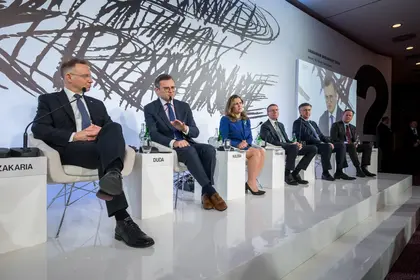For two days, I attended Ukrainian events around the World Economic Forum in Davos, Switzerland. They were numerous and included the Victor Pinchuk breakfast, the Pinchuk dinner, a DTEK breakfast, and a dozen excellent panels in the Ukraine House, sponsored by the Victor Pinchuk Foundation and Horizon Capital. President Volodymyr Zelensky also spoke in a major plenary session accompanied – as always – by his chief of staff Andriy Yermak.
Ukraine received a great deal of attention and was the focus of many events. US journalist Fareed Zakaria summarized the top three themes of the forum: artificial intelligence, the US presidential election, and Ukraine – all of which sounded correct.
JOIN US ON TELEGRAM
Follow our coverage of the war on the @Kyivpost_official.
As far as I could see, two points stood out from the many Ukrainian sessions:
- The confiscation of Russian sovereign assets was driven forward by many, notably the UK’s Foreign Minister Lord Cameron and Canadian Finance Minister Chrystia Freeland. Bill Browder and Tim Ash hammered away, with Tim and I agreeing that it now seems as if the confiscation is likely to happen.
- Many speakers made the point that the war is likely to last for years and that the European defense industry must expand and adjust (especially Ukraine’s Foreign Minister Dmytro Kuleba).
The mood on Ukraine was less pessimistic than I had expected, and it was as determined as ever.
Political participation in Davos has changed in recent years, especially since it has got a bad rap among top Western politicians who no longer want to be seen as schmoozing with billionaires. The only G7 leader in attendance was French President Emanuel Macron. Instead, Western countries largely sent their foreign ministers or those in similar positions. Therefore, the focus of the key events was foreign policy.
Pinchuk's enormous breakfast meeting on Jan. 18 attracted some 300 people. In addition to Cameron and Freeland, speakers included:

NATO Finds Gaping Holes in Europe’s Defences
- Croatian Prime Minister Andrej Plenkovic.
- Dutch Defense Minister Kajsa Ollongren.
- Latvian President Edgars Rinkevics.
- Lithuanian Foreign Minister Gabrielius Landsbergis.
- Norwegian Foreign Minister Espen Barth Eide.
- Polish President Andrzej Duda and Foreign Minister Radek Sikorski.
- US Special Representative Penny Pritzker.
Swedish Foreign Minister Tobias Billström spoke at the Ukraine House the previous day. They all argued strongly in unison for Ukraine.
The tone has evolved. What struck me most was how the confiscation of Russian sovereign assets had risen to the top of the pecking order, with Freeland and Cameron taking the lead and encountering no opposition.
The White House appears to have decided to lead on this issue with full support from the UK, Canada and Japan. Meanwhile, Germany is most resistant for unclear reasons, leaning on the European Central Bank that clearly does not understand the issue. France and Italy lean toward Germany, which needs to be straightened out.
None of the speakers complained about any Ukrainian failure in the war. On the contrary, several thanked Ukrainians for their defense of the West and regretted that the West had failed to deliver the tools Ukraine needed to defeat Russia.
Recognition that Russia must be defeated
Lithuania’s Minister of Foreign Affairs Gabrielius Landsbergis emphasized that the collective aim should be Ukraine’s victory and put it starkly that Ukraine needed not 40 HIMARS but 400 and not 80 Abrams tanks but 1,000, as Poland has ordered for its own defense. If the West delivered what Ukraine needed, it would win the war, which seemed to be the consensus among Western politicians present.
A general insight was that peace with Russia is impossible. It had to be defeated. Several speakers emphasized that such an outcome required two things – money and arms. Cameron underscored that the GDP of the West is 25 times that of Russia’s, and that this collective economic strength needs to be deployed against Russia. He compared the situation to the 1930s, when the West had failed to mobilize in time against Hitler.
The Baltic nations have come up with the idea that EU countries should commit a certain share of their GDP. Lithuania’s former Prime Minister Andrius Kubilius has suggested that all EU countries should devote 0.25 percent of their GDP to Ukraine’s defense and reconstruction. This idea is gaining popularity.
Kuleba was in great shape. One of his main points was that the West must build up a proper defense industry so that it can stand up against the long-term Russian threat.
A consensus prevailed that Russian President Vladmir Putin would not stop unless he was stopped; that he wanted to pursue war for as long as he could; that he needed war to stay in power; and that it is meaningless trying to negotiate with him, since his goals are the destruction of Ukraine and permanent war. Therefore, all favored building European armaments.
After the departure of Zelensky and Yermak, the remaining prime Ukraine representatives were Kuleba, Yermak's economic deputy Rostyslav Shorma, and Minister of Strategic Industries Oleksandr Kamyshin. In addition, many varied Ukrainians flooded the Ukraine House, where I spent most of my time.
The reader may have noted who was not present or represented. US Secretary of State Antony Blinken and National Security Advisor Jake Sullivan had departed, and no minister from Germany, France or Italy was to be seen, though less prominent officials attended.
My overall impression is that Ukraine has recovered international attention following a lapse caused by the Hamas-Israel war. President Zelensky delivered a great performance. Ukraine’s many friends gathered in strong support.
The new insights are that Russian sovereign assets need to be confiscated and that the West needs to dig in for a long war with regard to both financing and arms supplies.
The views expressed are the author’s and not necessarily of Kyiv Post.
You can also highlight the text and press Ctrl + Enter






